

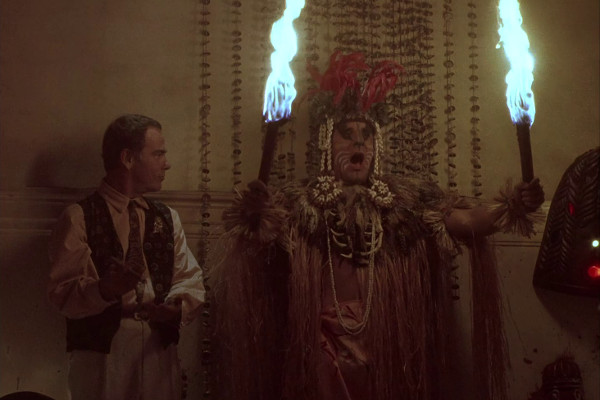
A surprisingly enjoyable tale, with Sam on a quest to stop a girl making a bomb to protest against Vietnam. Against this the frat is just a backdrop, and, while the episode's assertion that fraternities are often just "innocent fun" (backed up by Al) may seem wide of the mark, this isn't quite the gross-out tribute to John Belushi that its title alludes.
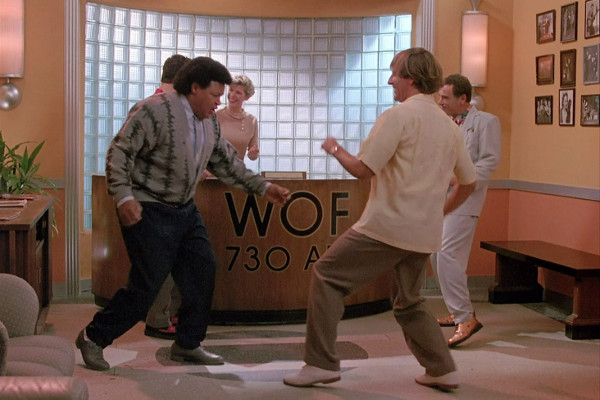
DVD purchasers outside of America got a better deal with Quantum Leap, where strict US copyright laws meant the many songs used in the programme required expensive rights, and were frequently omitted from the Region 1 discs. At a Comic Con convention in 2012, Scott Bakula lamented "Universal cheaped out on the music, so the first season is great, and then after that... it's just elevator music. I just hate it so much."
Of all the Quantum Leap episodes to require music, arguably the hardest hit is an episode where Sam is a rock and roll DJ. Six of the thirteen tracks remain present, largely because they're referred to in the dialogue and so couldn't be omitted without the episode making no sense at all (most notably a scene where Sam teaches the real Chubby Checker the Twist), but Elvis's "All Shook Up"/"Jailhouse Rock", Buddy Holly's "Maybe Baby", Santo & Johnny's "Sleep Walk", The Coasters' "Yakety Yak", The Isley Brothers' "Shout" and (crucially for the narrative) The Five Keys' "The Glory of Love" are all wiped and replaced. (Little Richard's Tutti Frutti, while present here, was replaced by muzak for the previous episode's teaser).
The only other real contender in this is the season finale, M.I.A., which also had pivotal songs removed. Thankfully all are restored for the BluRay release, and, while, as noted earlier, some of the darker scenes (including the dance scene in M.I.A.) can be a little "grainy", they can at least be experienced as intended.
Good Morning, Peoria is a decent, relatively involving episode, although Sam doing his best Robin Williams routine is a little toe-curling to watch in places. This rewatch of season two was initially done from the DVDs, before investing in the BluRay around the halfway point. As a result, another quick glance at this episode showed it to be better than it seemed, which does beg the question... how substantial can an episode be, if the enjoyment of it is almost entirely tempered on its soundtrack? Though a bigger question is... why did Chubby Checker record a song about a dance called the Twist if he didn't actually have a twist dance to go with it? Thank goodness Sam was on hand to help him out...
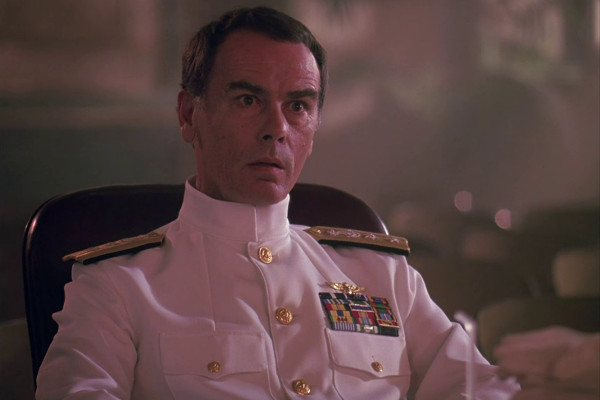
A decent, if not great, season opener where viewers learn that the Quantum Leap project requires $2.4 billion a year to run, and that the senate want to pull the plug and axe Quantum Leap. This isn't made particularly meta, given that NBC were always on the verge of doing the same, but then the series didn't cost $2.4 billion a year to make, something very much illustrated by an episode that looks cheaper than usual.
Sam's strict moral compass really begins to assert itself in this season, with him insisting to Al "It's not morally right to sleep with a woman that you don't love." This does produce a wry chuckle at the end, where Sam, finally relenting and deciding to sleep with the woman he's spent his leap with, realises that he's going to leap out at a crucial moment.
An ending where Sam changes history and thus secures Quantum Leap for another year is a nice one, even if the make-up used to make a character look much older is very much "Lea Thompson in Back to the Future" in order of how convincing it is. In all, this is an okay episode, but better was to come. Though in the end result it perhaps didn't really matter... the series was pushed out at 10pm and all but buried in the ratings, only seven of the run's episodes charting in the top 50... and one of those was a mid-season repeat screening of season one's Camikazi Kid.
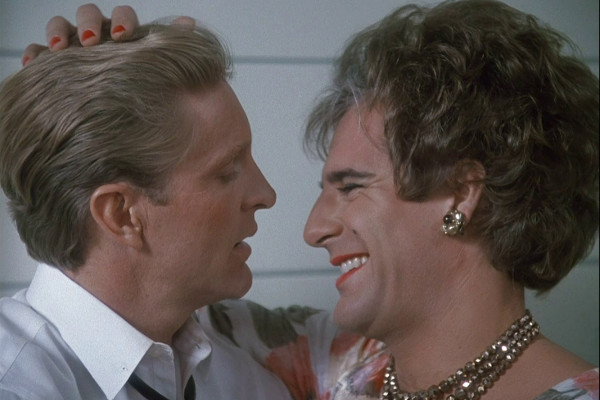
If jokes work on the element of surprise, then Sam becoming a woman for the first time was slightly diluted by having it appear in the opening credits of several prior episodes. Not that Sam being a woman should always be played for laughs (and, as later episodes will show, it isn't), but for this first occasion the sight of Scott Bakula in high heels is mined for every broad laugh it can get.
Rewatching any series through the prism of thirty years of history will flag up references that have aged badly, particularly after 2018, the year where #MeToo really blew up in the public consciousness. So it is that What Price Gloria? Has some confusing and confused messages for viewers, presenting sexual harassment in a 60s workplace for cheap laughs.
Not only this, but Sam ends his first leap as a woman by assaulting a man because he has the strength to, whereas a woman wouldn't have the same ability. This isn't the last time where Sam's entry into a gender-swapped world would conclude with him deciding that the best course of action is to beat a man up because genetics have given him an advantage that the host didn't have. While on some level well-meaning - and the episode was written by a woman, Deborah Pratt - it can come over and misguided and patronising.
Other concerns when watched in the present day are the horror of the boss when Sam tells him he's still biologically a man - "you did a Christine Jorgensen?" - Al's self-confessed "repressed homosexual crap" as he sees Sam as the host he's leapt into (though not in later episodes, presumably having asked for it to be reversed after this) and the fact that a character we're supposed to feel sorry for is trying to have an affair with a married man.
All of which analysis is perhaps taking a screwball comedy episode way too seriously... but then, why shouldn't sexual harassment in the workplace be taken seriously, and not with the cause of the harassment hearing tweeting birds as he loses consciousness? Look, it's Scott Bakula almost tripping over in high heels... have a cheap laugh, and move on. Oh boy.
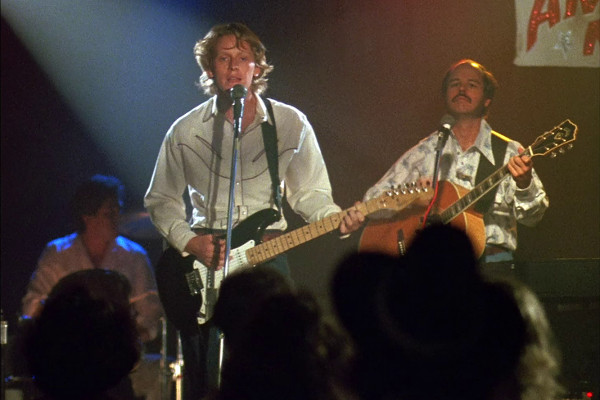
Sam leaps in as a stuntman in the 1970s, including an appalling moment where the show pretends that he was in Earthquake. Initially bordering on pastiche, this episode lacks a real hook to keep the audience involved, letting gullible viewers believe that Sam has been shot, before revealing that it's all just pretend on a movie set. After which, the storyline meanders, before it picks up on Sam remembering that he has a deceased older brother called Tom.
With Sam's memory "Swiss cheesed" due to his leaping in time, the revelation of his family adds a personal resonance to an episode that sorely needs one. Another plus is the inclusion of a fairly catchy song, that even those allergic to a Billy Ray Cyrus sound should be able to tap a foot to.
Interestingly, Sam shows a slight edge when he thinks to himself of the era that it was "the self-obsessed 70s when everyone was 'getting in touch with their feelings'." It's a moment that makes you realise that Sam can be reactionary, depending on the writer, and might live in 2019 saying things like "it's political correctness gone mad!"
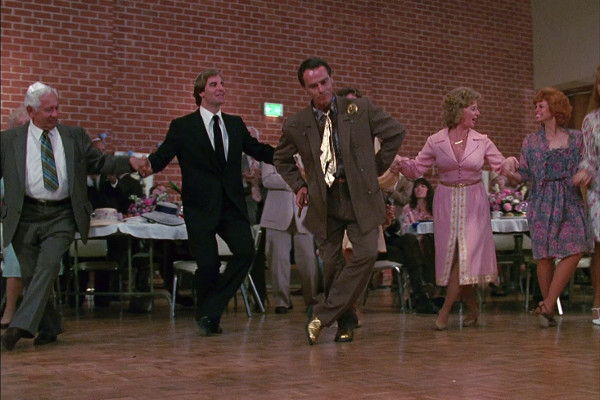
An emotionally raw episode with a family in turmoil, this isn't the easiest Quantum Leap episode to watch, as it features a marriage breaking down. The guest cast perhaps don't grab the viewers as much as in other episodes, but it's still an intense experience, with a great twist regarding the person who the wife will have an affair with.
The plot takes a while to get out of first gear, as it's almost ten minutes before Sam asks Al what the mission actually is, but there's still plenty to enjoy, from Sam stopping a dinner guest from choking (who turns out to be Heimlich) and Al, as pictured, dancing the Horah.
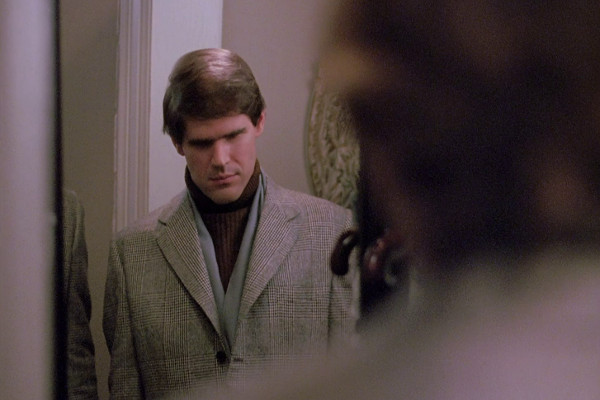
Blind Faith is actually a fairly engrossing story, despite many things going against it. It's a story that has Sam leap in as a blind piano player, which is expected to be enough by itself to get viewers hooked. Yet Sam leaps in physically, meaning a drama where "man leaps in and has to pretend to be blind" is a lot less engaging than an episode where he actually is.
Perhaps realising this, a bit of artificial drama is added with a murder plot, and Sam gets to experience blindness after flashbulbs go off in his face. Yet Quantum Leap is at its worst when it patronises its audience, and having his spell this out with a "I may as well be blind" is spoonfeeding at its worst... at least, it is until Al gets the stinker of a line "I think you opened her eyes, Sam".
One of the first episodes where the viewers spend time with characters not directly associated with Sam, the whole thing causes Al to take something of a back seat in the narrative, not even appearing until almost a quarter of an hour in. Dean Stockwell is a great actor and has chemistry with Bakula in spades, but he's also a man who never needs to be told "you can play it bigger if you want to", and here his hand gesticulations are at their fullest, possibly to compensate for his smaller role.
If this summary sounds overtly critical, then it is an appealing instalment despite these issues, and its high top ten placing either indicates that it's better than my detractions have made it sound, or that season two - a slightly bland season, overall, if I'm really being honest - has a generally low quality.
Finally, as Quantum Leap was made in the pre-internet era, there's scant information on how it was actually made, with just bits and pieces here and there. While today the "mirror reflection" effects would be done by CGI, it was still primitive at the time - as evidenced by any scene in which Al is "holographic" - and so is presumably done the old-fashioned way in the series, by clear glass arranged at an angle, and the "reflection" performed live.
Gloria's friend in What Price Gloria? had a twin sister which made this easier, but with Blind Faith and Jimmy, the artifice is given up, as both episodes show Bakula's shoulder in the reflection. This is perfectly understandable given the people involved - Jimmy is played by an actor with learning difficulties, and Blind Faith is played by a genuinely blind man - but does also indicate how little time they had to complete these sequences. A screen capture from this sequence is used to illustrate the episode, above.